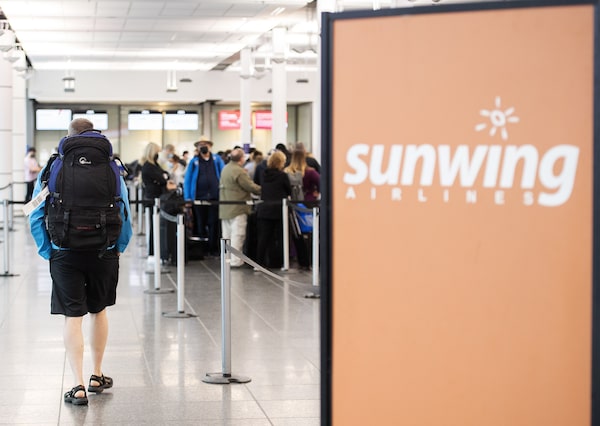
In March, the federal government approved WestJet’s acquisition of Sunwing despite warnings from the Competition Bureau that a takeover would lead to higher prices and less choice for Canadian travellers.Graham Hughes/The Canadian Press
WestJet’s decision to wind down operations of recently acquired Sunwing Airlines will mean less competition that will result in higher prices for consumers, airline industry experts and passenger rights advocates say.
“It’s going to mean higher prices and worse service,” Gabor Lukacs, president of Air Passenger Rights, a Halifax-based advocacy organization, said of the merger.
In March, the federal government approved WestJet Airlines Ltd.’s acquisition of Sunwing Airlines Inc. and Sunwing Vacations despite warnings from the Competition Bureau that a takeover would lead to higher prices and less choice for Canadian travellers.
In a statement sent to The Globe and Mail on Sunday, WestJet public relations co-ordinator Julia Kaiser confirmed that Sunwing Airlines will eventually be integrated into WestJet, although “the anticipated timeline to do so has not been determined at this time. Our immediate focus remains on the integration of Swoop’s highly successful business model across WestJet’s operations.”
Onex Corp. acquired WestJet in 2019, and the move to wind down Sunwing operations is likely being driven by what the investor and asset management firm sees as an opportunity for cost reductions, said John Gradek, faculty lecturer and academic programs co-ordinator of supply chain, logistics, operations and integrated aviation management at McGill University.
“Onex has been waiting for WestJet to make some money ever since they bought them back in 2019. And they’re smelling some interesting prospects in terms of profitability,” he said.
In an internal memo obtained by The Canadian Press, Sunwing Airlines president Len Corrado said the integration will likely take two years.
“WestJet will eventually move to a one jet aircraft operating certificate (AOC) model and Sunwing Airlines will be integrated into WestJet,” Mr. Corrado said in the memo.
Ms. Kaiser said that Sunwing Vacations will continue to operate as part of WestJet Group and will not be affected by the airline integration.
Ottawa set a number of terms and conditions in approving the acquisition, including maintaining capacity on the most affected routes, increasing regional connectivity, extending Sunwing packages to five new cities, and keeping both a vacations business head office in Toronto and a regional one in Montreal for at least five years.
In a report published last October, Canada’s Competition Bureau warned that WestJet’s acquisition of Sunwing Airlines and Sunwing Vacations would ultimately hurt consumers.
“Eliminating the rivalry between these integrated airlines and tour operators would likely result in increased prices, less choice and decreases in service for Canadians. It would also likely result in a significant reduction in travel by Canadians on a variety of routes where their existing travel networks overlap,” the report said.
Transport Canada said in a statement that the decision to approve the acquisition “incorporated the findings of the Commissioner of Competition, and consultations with Canadians, consumer protection groups, unions and industry.”
But when it comes to the acquisition and its possible effects on those wishing to fly, Canadian consumers need a much stronger voice representing their interests at the federal level, Mr. Gradek says.
“The Canadian consumer is looking at somebody in Ottawa kind of running oversight on reductions in service levels, or increases in prices, as a result of this consolidation. So hopefully we’ll see a statement coming out of Ottawa to basically put the industry on notice saying: This is not a free ride, guys. And we’ll make sure we’re on the sidelines watching your behaviour.”
While WestJet’s decision to wind down Sunwing Airlines operations will almost certainly lead to higher prices, Mr. Gradek said that is only one of many issues in the delivery of airline services that need better oversight from the government, he says.
“The Canadian consumer is not being represented. And there is no Canadian consumer body that basically stands up and says: What about us?”